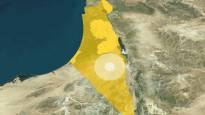In this story, we tell you why the hatred between Israel and Iran can turn into a major war in the Middle East at worst.
The background of the crisis is an old dispute in the Middle East over the status of the Palestinians. In it, Iran supports all of Israel’s enemies.
Why is the Iranian attack such a big news story even though no one was killed?
Because Iran now struck Israel for the first time.
Iran’s attack is big news because Iran has never before directly attacked Israeli soil, says a Finnish Middle East researcher.
– Such an attack has been feared for a long time precisely because it can cause conflicts in the Middle East to escalate, says Susanne Dahlgren, who heads the Finnish Middle East Institute in Beirut. interviewed him by phone.
In practice, escalation would mean a bigger war.
Iranian and Israeli missiles and air forces could cause great destruction. Also, Israel has nuclear weapons, and Iran could probably produce them quickly as well.
Why do Israel and Iran hate each other so much?
Iran considers Israel its worst enemy and does not accept the state of Israel. That is why Iran supports Israel’s opponents across the Middle East.
Iran and Israel do not have diplomatic or trade relations. Iran considers the main reason for the ceasefire to be the conflict between Israel and the Palestinians.
– Iran is strongly on the side of the Palestinians, and thus considers Israel an occupying state that oppresses the Palestinians and prevents the realization of the Palestinians’ national rights, says Dahlgren.
In addition to this political strife, there is strong anti-Semitism in Iran, even though the country also has a small Jewish minority.
– Unfortunately, there is anti-Semitism in the Middle East. Sometimes supporters also get confused as to whether they hate Israel’s politics or the fact that it is a Jewish state, says Dahlgren.
In Israel, Iran is seen as an enemy because Iran supports Israel’s most violent opponents: Hezbollah in Lebanon, Hamas in Gaza, and the Houthis in Yemen. All of them are fighting against Israel by force.
How do neighbors choose sides?
Other countries in the Middle East do not want to be a party to the conflict. They try to prevent their airspace from being used for attacks.
For decades, Iran has supported Hamas, which is active in the Palestinian territories, and Hezbollah, which controls southern Lebanon. Until now, Iran has used these organizations as a proxy for attacks against Israel.
The extremist organization Hezbollah and the terrorist organization Hamas, as well as the Houthis, who rule northern Yemen, are automatically on Iran’s side because Iran provides them with arms.
Many countries in the region have found themselves in a nasty middle ground.
– For example, Jordan is a very staunchly anti-Israel state, but nevertheless tried to repel Iran’s missiles, Dahlgren points out.
According to him, Jordan still has not moved to the Israeli camp. When others are skirmishing, the most important thing is to control the interest of one’s own country.
– Jordan and other countries will have to see what the consequences of these missiles could be on their own soil and population, says Dahlgren.
That is why many countries have closed their airspace.
Why did Iran attack Israel?
In early April, an Israeli strike killed prominent leaders of the Iranian armed forces in the Syrian capital, Damascus. Iran assured that it would retaliate.
Israel has not acknowledged the attack, but Dahlgren thinks there is no ambiguity about the perpetrator.
– Obviously, Israel struck with a missile, as a result of which two high-ranking officers of the Iranian Revolutionary Guard were killed, says Dahlgren.
According to Dahlgren, the cycle of revenge was therefore complete.
– It was obvious that an attack on the embassy’s territory is against international law, and an attack on another country’s territory would be a clear risk, says Dahlgren.
For example, the United States considered an Iranian counterattack likely and therefore tried to defuse the situation.
What happens next? Is Israel retaliating against Iran?
A deeper cycle of revenge would be disastrous for the entire Middle East, but also for the world economy.
According to Dahlgren, no one wants a wider war – not Iran, not Israel, and especially not the Palestinians.
– And the United States and other Western countries have no desire for such a war. It would also affect Europe. International shipping would suffer even worse than it is currently suffering, and the price of oil would rise, Dahlgren reminds.
The war would have other consequences for Europe. It would further divert US attention from Europe to the Middle East.
– Bringing the war in Ukraine to an acceptable end for the Western powers would be clearly more difficult, says Dahlgren.
Much depends on how the United States pressures Israel to moderate.
– The United States is the one that is able to prevent Israel from launching a retaliatory attack, says Dahlgren.
However, Israel also has its own reasons for focusing on the Gaza war and not starting another war.
– Israel’s primary goal is to try to destroy Hamas and secondly to release the hostages. Concentrating military power elsewhere is a risk in achieving these goals. The third risk is that Israel’s distances Biden’s administration would be cut off, says Dahlgren.
